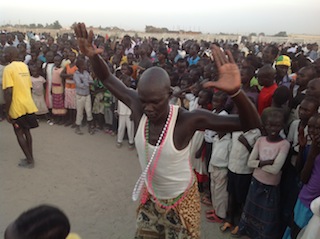South Sudan’s ethnic Nuer in government threaten war over power sharing
July 10, 2015 (JUBA) – Members of the Nuer ethnic group in president Salva Kiir’s government, the second largest single community in South Sudan after the ruling Dinka ethnicity, have threatened to continue to wage another rebellion should IGAD not drop the proposal giving armed opposition fighters allied to the former vice president, Riek Machar, majority control of the affairs and resources in the three states of the oil-rich greater Upper Nile region.

The group, according to their position paper, a copy of which was extended to Sudan Tribune, the Nuer in government said IGAD proposal lacked realities and would set a dangerous precedent if it was adopted and implemented by the parties as part of the imposed solution to end the 19-month long civil war.
The document signed by Nuer county commissioners fighting on the side of president Kiir’s government, said the paper would be presented to IGAD mediation as the Nuer position on the side of the government.
“That document is authentic. It is the position paper on the IGAD proposal by not only the Nuer community members in the government but also those in the communities as normal citizens”, Gatkuoth Biem Nyoak, commissioner of Ulang county in Upper Nile state told Sudan Tribune on Friday when asked to confirm the authenticity of the document.
Commissioner Nyoak contested the basis of the proposal, claiming that majority members of his Nuer ethnic groups were in the areas controlled by president Kiir’s government and that rebels controlled a small portion of the territory out of respect of the cessation of hostilities by the government forces and allied militia forces.
Nyoak was speaking on behalf of all the county commissioners and local government officials in the government controlled areas in the three states of Jonglei, Upper Nile and Unity who signed the rejecting document.
“As the Commissioners administering counties that have the biggest population of grassroots, we are obliged to reject the IGAD’s peace proposal because it is not anchored on realities on the ground but on false assumptions that will not usher in peace in the country,” the document reads in part.
The document said although it could be true that the Nuer ethnic group could make up over 55% of the population of the oil-rich region, there was no scientific justification for IGAD to conclude that all the Nuer were on the side of the rebels in order to justify allocating 53% of power to the SPLM/A-in Opposition.
“It is true beyond a reasonable doubt that out of 55% of the Nuer population of the region, at least 45% are in the territory controlled by the Government,” it further alleged.
It said even if the Nuer in the refugee camps in the neighbouring countries were to be considered part and parcel of the Nuer-led opposition movement, yet they could not make up 7% of the total Nuer population of the greater Upper Nile region.
“The Nuer on the side of the Government will resist the implementation of such a proposal through fighting,” the paper declared.
The document further alleged that the Nuer controlling Unity state could not relinquish the state power and hand over 53% of power to the armed opposition fighters, asserting that the IGAD’s peace proposal would be a recipe for another war which would be worse than the status quo.
It further claimed that giving majority control of the region to the Nuer dominated opposition group in the region will not be accepted by other ethnic groups and would create another war situation in the country.
“The Dinka, the Shilluks on the side of the Government, the Murle, the Anyuaks, Kumo, Jie, Maban and Kachipo will not accept the power of the three states to be handed over to the SPLM/A-in opposition without a fight,” it said.
The document, which also ventured to speak on behalf a faction led by Lam Akol, further argued that the regional proposal ignored the presence of other political parties in some of the states, specifically in the state of Upper Nile where the opposition Sudan People’s Liberation Movement for Democratic Change (SPLM-DC) constituted 25% of representation in Upper Nile state legislature.
“The SPLM-DC, although it doesn’t have Members of Parliament in Unity and Jonglei states, does have party’s offices and staffs, whose presence can be verified even before December, 15, 2013. How would the SPLM-DC that has 25% of legislative power as a result of the 2010 election in Upper Nile state accept the IGAD’s peace proposal that reduces its power-sharing to less than 2%,” the document inquired.
The signatories of the document include: Wal Yiey, commissioner of Leer county, Bol Mayak, commissioner of Mayom county, Nyuon Joak, commissioner of Panyijiar county, Kawai Chany, commissioner of Guit county, Salam Maliet, commissioner of Rubkotni county, Khor Gatmai, commissioner of Mayiandit county and Koang Biel, commissioner of Koch county in Unity state.
Other members extend to Timothy Taban Juch, commissioner of Akobo county, Peter Mabor Bol, commissioner of Uror county, Nyang Chuol Dhuor, commissioner of Nyirol county, Michael Buoth Malual, commissioner of Ayod county, Both Chuol, commissioner of Pangak county in Jonglei state; and Gatkuoth Biem Nyoak, commissioner of Ulang county, Paul Biel Chuol, commissioner of Maiwut county, Gach Wol Guandong, commissioner of Longichuk county and Elijah Liej Bany, commissioner of Nasir county in Upper Nile state.
(ST)
